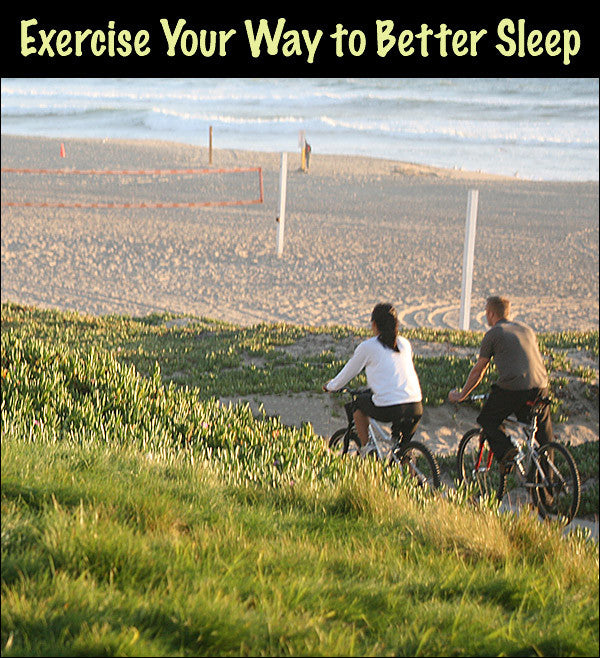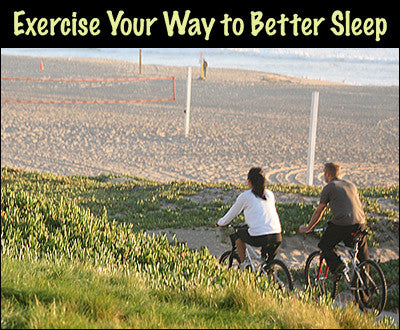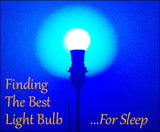Not Getting Enough Sleep? Bet You Don't Get Enough Exercise
Exercise can actually help us sleep better. There, we said it. But let's not get too far ahead just yet.

A little bout of insomnia or a sleepless night every once in a while usually isn't cause for alarm. Sure, it's a nuisance to drag through a few days because of a lack of sleep, but eventually we all tire out enough that routine sleep returns.
For those of us that typically have problems falling asleep, sleeping well through the night, or waking up too early and not being able to get back to sleep, it's important to examine why we have a problem.
What Causes Sleeping Problems?
There are many factors that can cause problems sleeping...
Mental issues like stress, anxiety, and depression definitely impact sleep.
Physical issues like chronic pain, injuries, arthritis, and others make it difficult to get comfortable to sleep through the night.
Environmental issues like too much light in the room, temps that are too high or low, too much noise, and many others also affect our sleep.
Poor eating habits such as drinking caffeinated beverages, alcohol, or eating certain foods too close to bedtime can all be problematic.
Prescription or over the counter medications might also inhibit good sleep.
All of these are common problems for not getting a good night's rest and most are fairly easy to control. Black out curtains or eyeshades can help with the light. Adjusting the thermostat will better regulate the temperature in the bedroom. Cutting back on food and certain drinks late in the day is easy enough to correct.
Changing medication might be a little trickier, although a doctor can help in this area.
Stress might be the most difficult variable to control, but there's one thing that can aid in eliminating stress AND mitigate better sleep: exercise.
Exercise Promotes Better Sleep and More
Countless studies have shown that regular exercise improves sleep patterns for people of all ages.
According to the National Sleep Foundation, 150 minutes of exercise a week showed a 65 percent improvement in the quality of sleep for men and women between the ages of 18 and 85 years old. That breaks down to two and a half hours of moderate to vigorous activity per week.
Almost every major news organization and medical association has discussed the positive correlation between regular exercise and proper quality of sleep for more than a decade, with new studies continuously being published.
A CNN article citing a recent sleep study puts the number of Americans suffering from insomnia at 108 million, stating that exercise is the healthiest way to improve sleep.
Exercise increases blood flow throughout the body and stimulates neuro-activity in the brain, specifically the output of serotonin, dopamine and norepinephrine, which are all feel-good chemicals that help improve mood.
By increasing these feel-good chemicals, or neurotransmitters, our mood improves and we starve stress, anxiety, and depression without using drugs to alleviate the symptoms. When mood improves, good sleep follows.
Regular exercise not only improves mood, but it boosts our overall general health and well-being. We have more energy during the day along with increased mental focus and clarity.
Exercise can also help with other sleep-related disorders such as sleep apnea and restless leg syndrome, further aiding in a restful night's sleep.
Everything we do on a daily basis has a positive or negative chain reaction on other aspects of our life. Not sleeping well at night carries over the next day to our mood, focus, and concentration. So it's of the utmost importance to ensure we sleep well.
The best way to ensure proper sleep is to get proper exercise. Not only is exercise free, but it's also easy to do, and it can be fun if you pick the best type of exercise that fits your lifestyle.
How to Get Started
If you're new to exercise, and you probably are if you're not sleeping, pick something that's enjoyable and easy to accomplish. Never feel like you have to do too much. People that start out trying to run a few miles either end up with an injury or sore at the very least, and stop altogether after a few attempts.
Start out by walking outside in the fresh air and sunshine. Instead of walking to fatigue, pick a distance that you know is within your limit. Try to walk at least every other day for 20 or 30 minutes and increase the time and distance when it feels comfortable.
After a week or two, as your body acclimates to the new activity, you should begin to notice an improvement in the way you feel both mentally and physically. Over time, you will look forward to walking every day until it becomes a habit.
Walking is the easiest way to get started for most people who have been sedentary for some time. Don't limit yourself to this one activity. There are plenty of ways to exercise that are easy, fun, and therapeutic.
Other beneficial exercise routines include:
- Biking
- Swimming
- Yoga
- Aerobics
- Pilates
- Spin Class
- Kayaking
The important things are to exercise regularly, make it fun, and increase the time and distance only when you feel comfortable. While you're at it, notice how you feel after you exercise and how much your sleep has improved from exercising. An improvement in one area will show an improvement in others.
One final note: don’t worry about the time of day you exercise. Older studies had shown that mornings were the best time to exercise, but recent studies have debunked the myth that exercising late in the day can prohibit sleep. Getting exercise at any time of the day is more important than when you do it.






